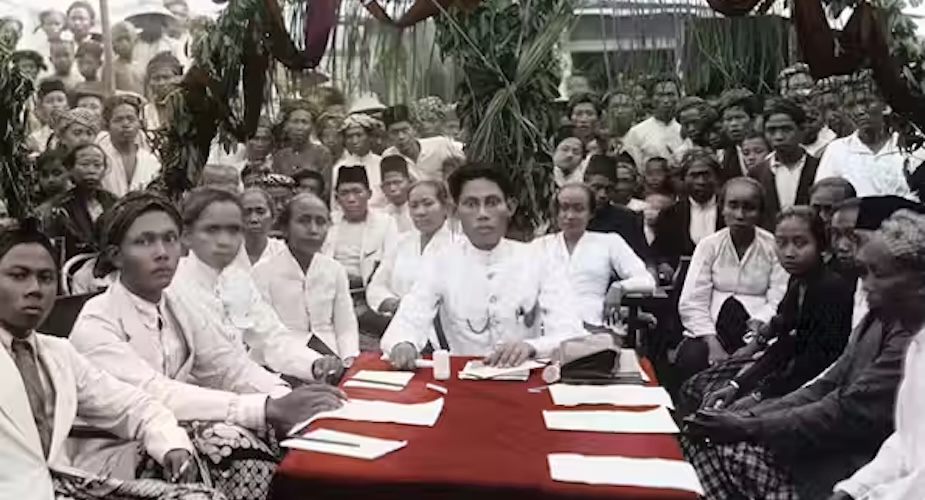Corruption continues to dominate discussion but is a different beast to what it once was
Elisabeth Kramer and Michele Ford
Discussions about corruption are nothing new in Indonesia. Over the decades since independence Indonesia has developed a global reputation for corrupt practices that shows no sign of diminishing. Currently, the issue is so pervasive that it is impossible to avoid. Knowledge of cases and figures embroiled in corruption scandals become part of your consciousness, whether or not you make an effort to seek out information about them. And while particular cases come and go, the theme of corruption continues to dominate discussion of current events in Indonesia.
There is a general acknowledgment that corruption permeates both public and private spheres. To get bureaucratic tasks done promptly has long required an informal payment of some sort. To get anything done in the parliament appears to be no different, with ‘envelope’ politics a common phenomenon. While anti-corruption initiatives such as the establishment of the Corruption Eradication Commission (KPK) and various projects by civil society groups attempt to change the status quo, the reach of corruption seems undeniable, even if it has now taken on new forms.
Ask any Indonesian on the street and you will find that this is common knowledge. So in this edition of Inside Indonesia, we set out to find some more nuanced discussions of corruption, of what has changed and what has stayed the same, in an attempt to better understand the inner workings of corruption and its impact on contemporary Indonesian society and politics.
Elisabeth Kramer sets the scene by examining the media discourse of corruption, which she argues is staged as an epic conflict between heroes and villains, the sensationalised imagery and soap-operaesque coverage of scandals and intrigue of which leave little room for people to doubt that the fight against corruption is a ‘war’ not close to being won. Nils Bubandt takes up this theme in an unexpected way, recounting how the leader of an Islamic boarding school in East Java sent a ‘spirit army’ to Jakarta to support demonstrators involved the 2009 anti-corruption day protests and to protect them from violence. The story, which was picked up by the major Indonesian media daily Kompas, drew widespread comment and criticism from Indonesians, some of whom sarcastically noted the absurdity of the claim, others condemning it as anti-Islamic. But, as Bubandt’s story reminds us, the spiritual world is never far from the Indonesian consciousness even when dealing with obviously material matters such as corruption.
The prominent anti-corruption crusader Luky Djani draws on his experiences sitting through corruption trials in the district of Garut in West Java to illuminate the relationship between Islam and corruption. He points not only to the long-standing relationship between Islamic organisations and the anti-corruption movement, but also the incongruity of cases where the accused clearly believe that superficial demonstrations of piety will save them from the sentences they deserve. Indonesian academic Budi Setiyono continues Luky’s discussion of the anti-corruption movement, providing an analysis of the changing role of civil society in the ‘war’ against corruption and the challenges faced in the implementation of anti-corruption measures.
The next two articles give us very real insights into those challenges. The article by Sylvia Tidey provides a fascinating insight into the resourcefulness of local officials in a small Eastern Indonesian town, who have found novel ways to keep the rupiah flowing in the face of tough new regulations in the construction sector. Fiona Downs follows up with a discussion of corruption in the forestry sector, arguing somewhat controversially that the now widely-accepted distinction between ‘speed money’, which simply allows the bribe-payer to complete a process quickly and efficiently, and forms of corruption that result in illegal behaviour doesn’t always play out as expected.
Simon Butt rounds out the issue with a discussion of the anti-corruption courts (Tipikor) and the impact of the system’s recent expansion into the region. Like Downs, Butt challenges the received wisdom on the anti-corruption world, arguing that the regional courts’ relatively low conviction rates (a source of concern in Indonesia) don’t necessarily mean that they are less effective than their Jakarta counterpart.
You may not agree entirely with their assessments, but one thing is clear: corruption remains a fact in Indonesia. It is also evident that while there are continuities in this realm, there are also many changes. Corruption is a different beast from what it once was – requiring new understandings and approaches if there is any hope in combating it. This special edition takes a small step in that direction.
Elisabeth Kramer (ekra2068@sydney.edu.au) is a PhD candidate at the University of Sydney, where she is researching the anti-corruption movement in Indonesia.
Michele Ford (michele.ford@sydney.edu.au) teaches Indonesian and Asian Studies at the University of Sydney.












